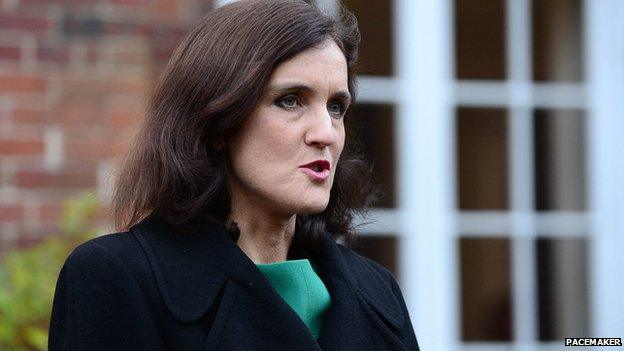The strange case of Lord Maginnis
- Published
- comments

Lord Maginnis told his local paper recently that, given the challenge posed by Scottish nationalism, he had decided to side with the Conservatives
David Cameron may have secured an outright majority in the House of Commons, but in the Lords the Conservatives face a trickier arithmetical task, external pushing through all their policies.
So you might think they would be glad of an extra vote.
The former Ulster Unionist leader David Trimble is now, of course, a Tory peer, and for a short while this week it looked like his old colleague Lord Maginnis was heading in the same direction., external
The former Fermanagh and South Tyrone MP told his local paper that, given the challenge posed by Scottish nationalism, he had decided to side with the Conservatives.
'Declined'
However, some elements to the story looked strange - not least that David Cameron's "personal invitation" referred to in the report reads like a generic e-mail punting for new members.
Sure enough, within a short time the Conservatives clarified that Lord Maginnis had "made an application to join, but it was declined".
"The party reserves the right to refuse membership," it said.
One can speculate that the Tories might have made their decision after considering the circumstances in which Lord Maginnis left the Ulster Unionists, including his controversial comments about same-sex marriage and bestiality.
But there is also another subtext to this story - an evident antipathy between the peer and the Northern Ireland secretary of state.
When Theresa Villiers was reappointed after the election, Lord Maginnis released an extraordinarily critical statement, arguing she was "considered by many to have little interest and virtually no understanding of the problems and sensitivities required for the position".
Lord Maginnis continued that Ms Villiers had "easily the poorest record of any who have held that post over the past 43 years".

Cypriots in Ms Villiers' constituency of Barnet regard her as a "stalwart and an asset"
'Stalwart'
While many might share the peer's evaluation that the pre-Christmas Stormont House Agreement has "virtually eroded before the ink on it was even dry", a more surprising line of attack to the uninitiated will have been his hostility towards Theresa Villiers' attitude, not to the division of Ireland, but to the division of Cyprus.
Ms Villiers' constituency of Barnet has an active Cypriot community, who regard their local MP as a "stalwart and an asset", external.
Ms Villiers demands "justice for Cyprus" and at a recent meeting during the election campaign pointed out that the Conservative manifesto backed Cypriots' efforts, external "to find a peaceful and lasting settlement to reunite their island".
By contrast, Lord Maginnis is a staunch supporter of Turkish northern Cyprus, speaking on behalf of their cause in the House of Lords, external and contributing a foreword, external to an authorised biography of the Turkish Cypriot leader Rauf Denktas released earlier this year.
In his statement on Ms Villiers' reappointment, Lord Maginnis criticised what he called her "high profile association" with the Greek Cypriot government which he described as "the inheritors of EOKA and EOKA-B terrorism".
The peer also questioned Ms Villiers' understanding of Middle-Eastern politics.
Lord Maginnis told me he remains a member of the Association of Conservative Peers and implied that the Tory statement saying he'd been declined membership wasn't the end of the matter.
But, while he and Ms Villiers might share the same view when it comes to the constitutional status of Northern Ireland, it seems unlikely they will be able to bridge their differences over the partition of an island 2,000 miles away in the Mediterranean.
No doubt the Conservative party is big enough to include members with different perspectives on the Cypriot situation, but the peer's full frontal assault on the secretary of state might have been another element the Tories will have pondered in assessing Lord Maginnis's application.